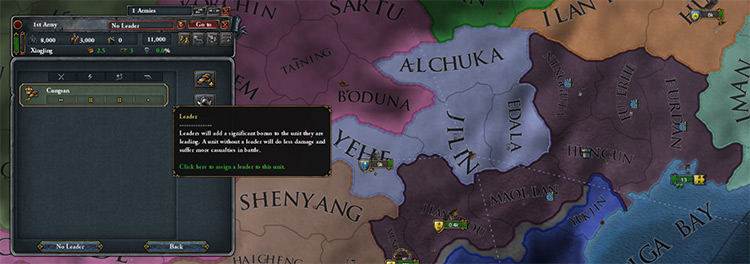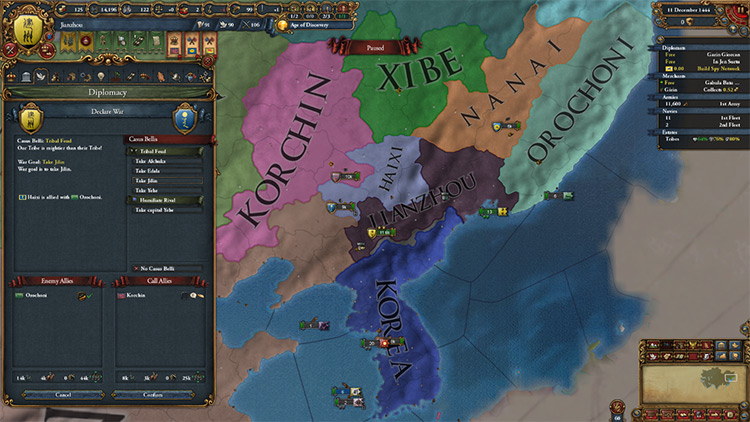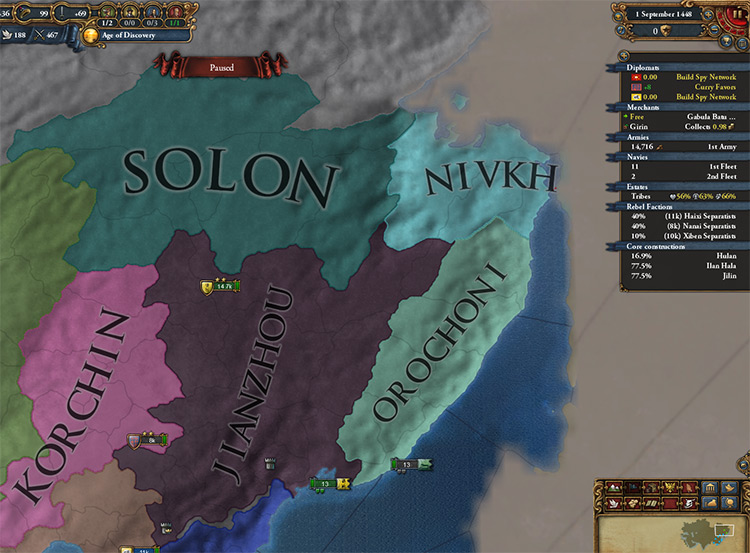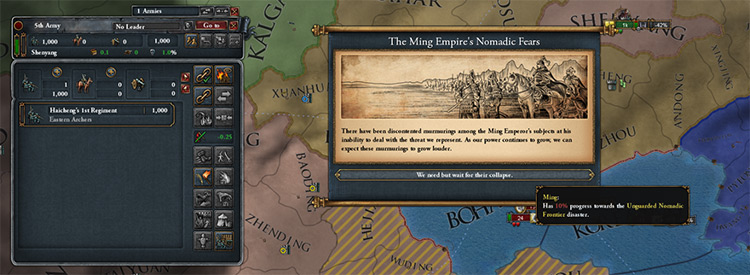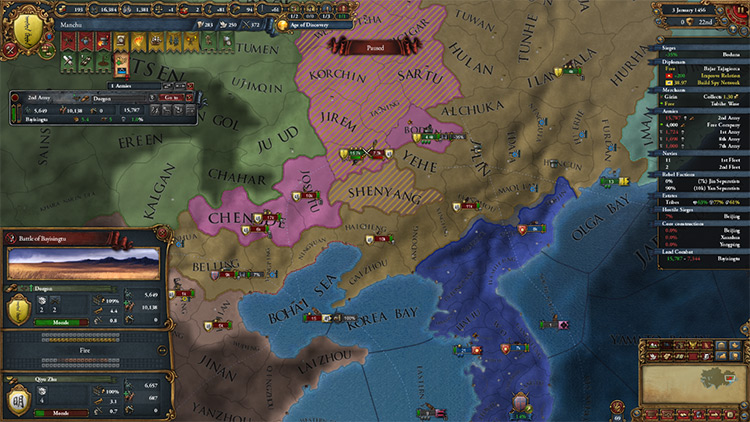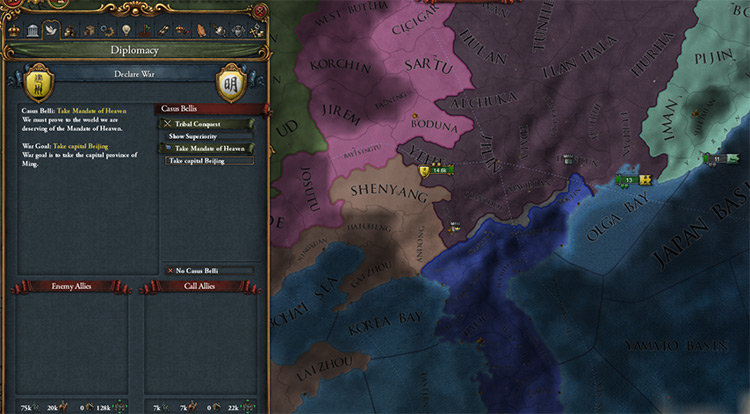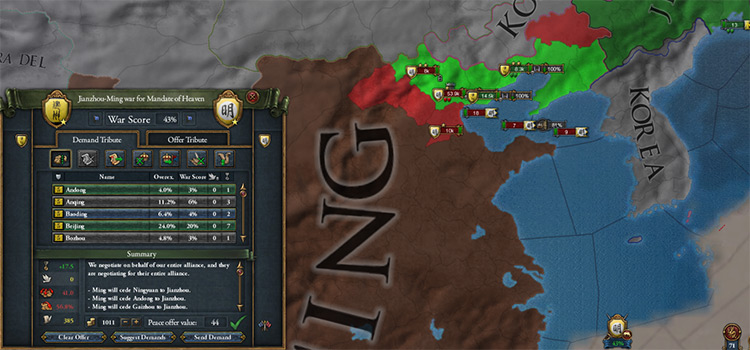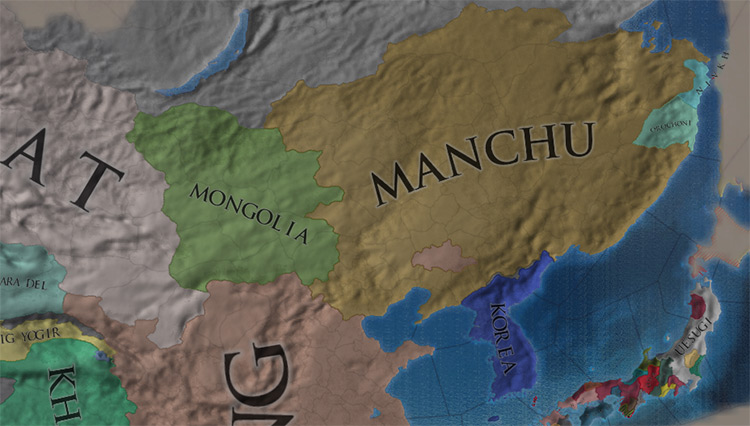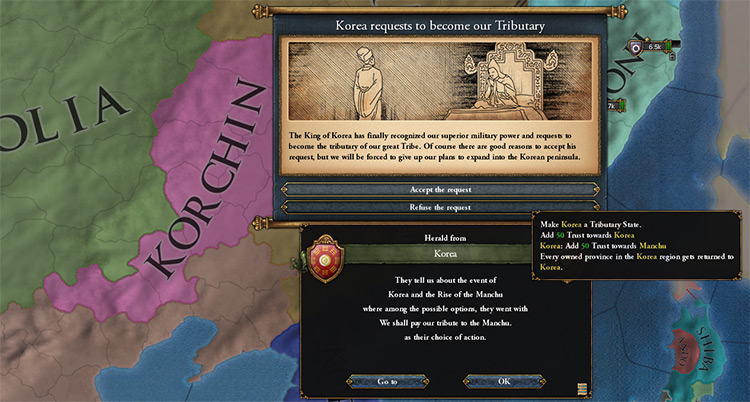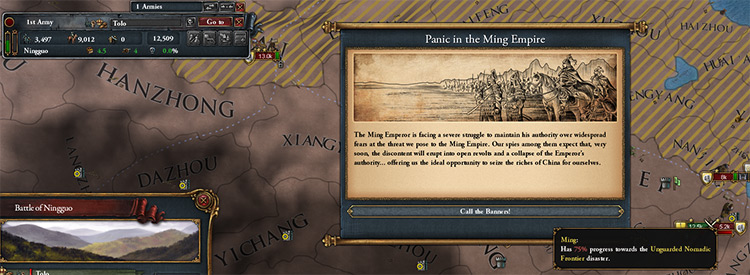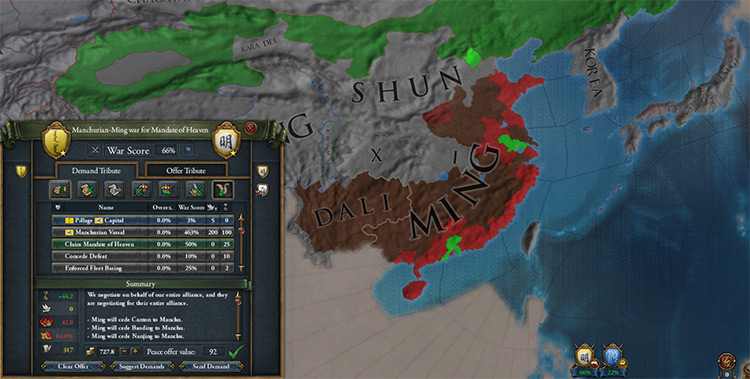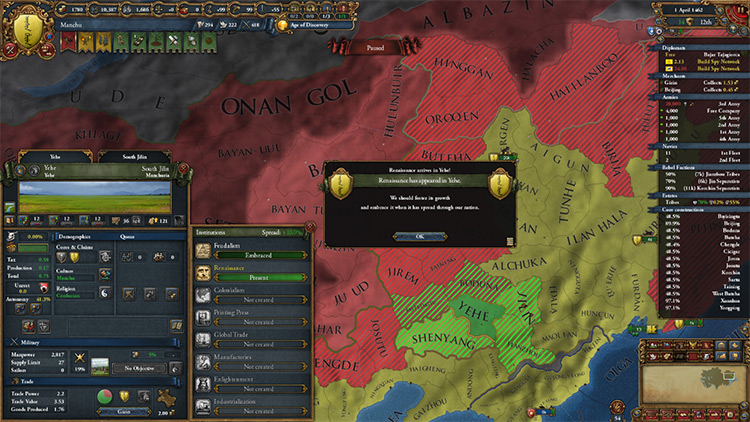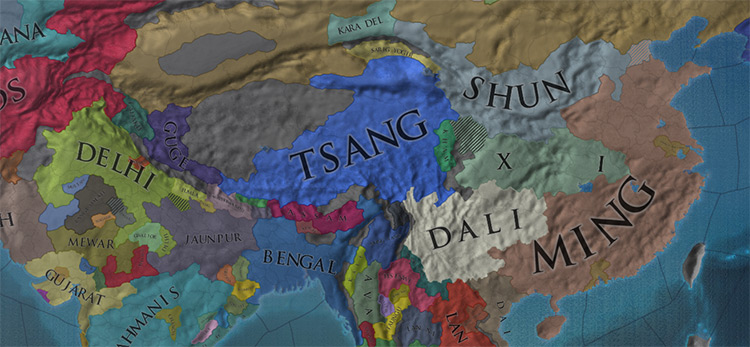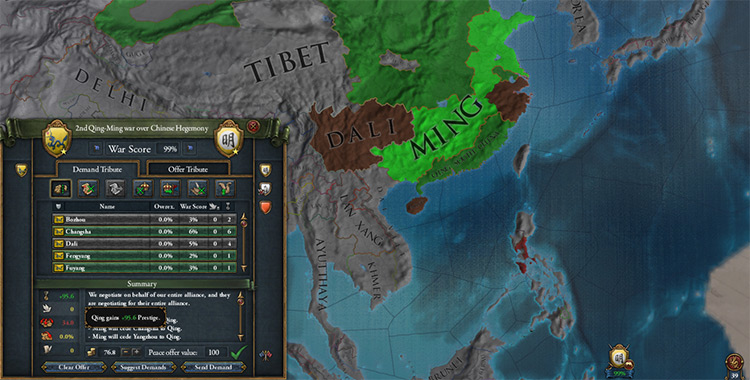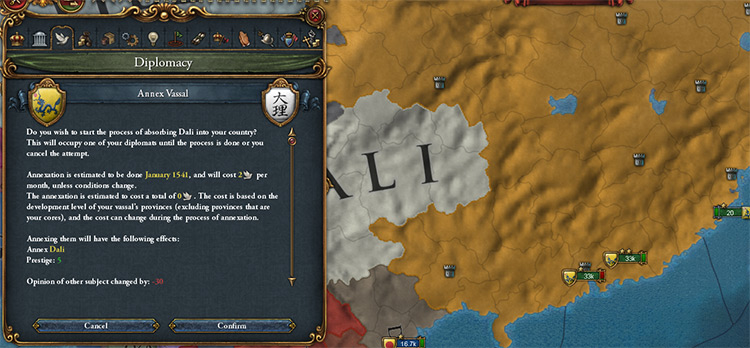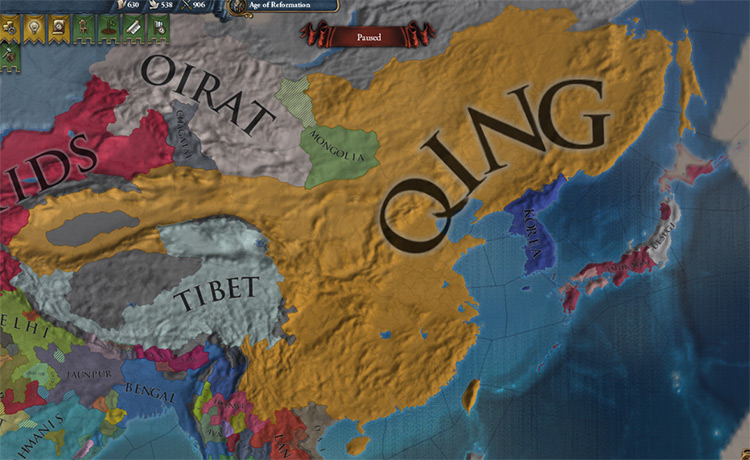The general idea of these campaigns is to first secure enough provinces to form Manchu and then attack Ming as soon as possible. After that, you can either rush claiming the Mandate of Heaven and forming Qing, or stay a horde for longer and push west into Mongol lands.
Selecting the Starting Nation
While all the Jurchen tribes have access to the Manchurian mission tree and can form the Manchu tag in the same way, the nation of Jianzhou is the obvious choice. Some of their advantages include:
Having feudalism already embraced Confucian as a syncretic faith from the get-go The most development amidst the Jurchens Good starting ruler and heir Ruler begins as an excellent general They have a mountain fort
There are no unique achievements tied to any of the tribes. All the relevant achievements can be achieved as any one of them. So, this guide will assume Jianzhou as the chosen nation. Although most of the information, especially after forming Manchu, is applicable no matter the chosen tribe.
Forming Manchu
You may have noticed your primary nation is Jurchen and not part of the Chinese culture group. This will change upon forming Manchuria. First, assign privileges to the tribes estate as shown in the picture below. You can also sell crown land to them; you will regain it quickly as you rapidly conquer land. Recruit 4 banner cavalry from the military tab. Banner units immediately spawn at 10% strength and slowly reinforce. It will take them some time until they are battle-ready. You can opt to ally Korchin. It is not necessary though. If you do, be certain they do not occupy any land you want during wars. You will expand into Korchin soon, so the alliance is temporary. Put your neighbors as rivals. Usually Orochoni, Haixi and then Korchin or Korea.
Opening Wars
Instantly declare war on December 11th (the soonest date possible) on your neighboring tribes. The exact tribe depends on how alliances have formed in the game’s first month. In my experience, Haixi is the best first target. Even against two or even three enemies you can win these wars. Your starting general and a discipline or morale of armies’ advisor are enough to win any engagement of equal numbers. Just make sure not to fight in unfavorable terrain. Your first goal is to conquer at least 13 provinces with Jurchen culture. You already start with 7 and we need 20 to form Manchu. Conquering Haixi, Nanai, and Xibe is enough. These three nations also control the provinces necessary for the first mission of yours. These are Hulan, Ilan Hala and Jilin. The fourth province, Huncun, you already control. Do not core any provinces except the three mentioned above. After fulfilling the first mission, you will get permanent claims on all of Manchuria. This includes the provinces you already conquered. Hence, you will have a -25% reduction in coring the rest of the provinces. After coring these three, core the rest of the provinces. If you have fully annexed these three nations like in the picture above, you will have 21 provinces. Core all but one of them to save some administrative power. Usually, Orochoni will be allied to at least one of the nations I recommend moving against first. You can deal with them however you wish, even getting land from them. However, as they will be a co-belligerent it is not worth it. Simply demand money from them and humiliate them for some easy Power Projection. After you finish coring the rest of the provinces, you can form the nation of Manchu. Now you have cores on the entirety of the Manchuria region. On top of that all, Jurchen provinces (even those outside your control) have flipped to Manchu culture. Manchu is part of the Chinese culture group, making your future conquests into China smoother.
Choice About Tributary Status
At this point you have a choice to make. You can either: If you stop, they will break the tributary relation after a couple years of your refusing tribute.
Choice 1: Staying As Ming’s Tributary
This is the safest option. Your next steps should be to finish up the conquest of Manchuria and annex Korchin. If you opt for that route, it is advisable to reach 300 development before your first war against Ming. If you do not want to develop your lands (and you shouldn’t as it’s not worth it) this might mean expanding into Mongolia and fighting Oirat. Having 300 development and bordering Ming while not having a truce with them will progress the “Unguarded Nomadic Frontier” disaster for them. This keeps ticking up while you are at war with them, even speeding up if you are winning the war. When it happens, this disaster massively tanks Ming’s mandate of heaven and gives them a lot of maluses which render them trivial to beat in a war. Despite triggering the disaster making fighting Ming trivial, it takes a lot of time. Fighting Ming the soonest possible will give you a lot of money to fund your early wars. More than 2000 ducats every time you beat them. Going with the tributary option means you will suffer money problems until moving into China.
Choice 2: Breaking Tributary Status
Upon finishing your initial conquests and securing the land necessary to form Manchuria you declare war on Ming. You do not even need to wait for the cores to finish and form Manchu. You do not need to fulfill the conditions yet for the second mission either, which needs 25 provinces in Manchuria. The mission gives you a great general, but as Jianzhou you already have one. Your armies will mop the floor with Ming’s troops, even when their mandate is high. Your horde advantages on FLAT TERRAIN, your great generals, and bonuses from mission rewards are enough to assure your victory. Occupy Beijing and Shenyang. Carpet siege as much of Ming’s lands as possible without attempting to siege other forts. These two are on flat terrain and Ming cannot defend them. In the peace deal, demand all of the Liaoning peninsula and the North Hebei area, as seen in the picture below.
- Fight in flat terrain As a horde you suffer penalties in non-flat terrain and bonuses in flat terrain. The difference is massive, especially when you are outnumbered like in this case.
- Do not siege too many forts Especially the mountain forts near Beijing. You can lose fights if you get engaged there or suffer many casualties even if you win. Due to their fort defense, you will also lose time and men sieging them.
- Raise devastation in Ming lands After occupying Beijing, the road towards China’s rich flatlands lays open. You can occupy and devastate the coastal provinces in the Bohai and the Yellow Sea with ease. Devastation will decrease Ming’s mandate.
- Consolidate your armies and fill the combat width Always try to fill at least the combat width (20-24), depending on the date you declared. Consolidate your armies so they fight more efficiently. You can opt to not annex Shenyang until later. This is so you can trigger the “Treachery at the Great Wall” event later, which requires occupying Shenyang while its owner has less than 50 mandate. This isn’t anything special, it gives you an OK general. However, if you then progress your mission tree and vassalize the nation of Dali with this general alive, you can get a unique nation to spawn and replace Dali as your vassal.
After the First War
After defeating Ming initially, it is time to circle back and mop up the rest of Manchuria and eastern Mongolia. Fighting and defeating Oirat is not as hard as it looks. If you haven’t formed Manchu yet, now is the time to do it. Upon forming Manchu, you will get an event to make Korea your tributary. The choice is up to you. Beware though that making them your tributary will lead to them allying with Ming.
Next Steps After Forming Manchu
As Manchu, you are still a horde. You should have already secured the provinces necessary to form Qing, but there is no rush. You can take advantage of horde mechanics and push westwards a bit more. This doesn’t mean that you shouldn’t fight Ming the moment the truce ends. Your next goal is to trigger the “Unguarded Nomadic Frontier” disaster if you haven’t already. When it triggers, peace out for money and maybe a couple provinces so your truce with Ming is short.
1. Choosing Idea Groups
There are many options. If you want, you can even go exploration and colonize. My recommendation is Offensive-Humanist-Trade for the three first groups.
Offensive – Pairs very nicely with Manchu’s national ideas and Great Qing’s later. This will ensure you get great leaders consistently. The whole idea group is useful in general, regardless of the country. Humanist – It’s an insane combo with the Confucian religion that you will eventually follow. Almost no revolts and easier harmonization with other religions. Trade – Controlling all of China as state provinces and having your capital there means you need as many merchants as possible to fully make use of your land. Your trade income will considerably increase after finishing this idea group.
2. Claiming the Mandate of Heaven (Forming Qing)
While waiting for the short truce with Ming you can expand eastwards toward the lands of Chagatai and Oirat. When the truce ends declare war on Ming. Due to their disaster, they may have already started disintegrating. Winning wars against Ming from now on should be trivial. Their Mandate will be at 0 constantly, which means their troops will be paper and they will have little to no manpower. If the nation of Shun revolts against Ming, you will have the option to declare war on them. Accept it and only conquer their provinces outside of China. You will conquer their Chinese provinces later with the “Unify China” CB, which grants cores on occupied Chinese provinces. You want to first claim the Mandate of Heaven before further expanding into China. It is imperative that you conquer Canton, Nanjing, and Beijing before claiming the mandate. You will suffer a penalty to your mandate of -0.05 per month for each of these provinces outside your control. After claiming the mandate, you can form Qing. Doing so expands your mission tree considerably and converts you to Confucian if you haven’t done so already. Now, as the celestial emperor, you can use the “Unify China” casus belli to conquer all the Chinese lands.
3. Setting up the Economy
Up until now, your economy was essentially whatever money you demanded from Ming after every war. After you start moving into China’s rich lands your income will start increasing considerably. Do not state any lands outside China and Manchuria. Your governing capacity will reach its limit very fast, and it is preferable to state the rich provinces in China. After conquering all of China, move your main trading city in Beijing (It should be there if it is the capital, and you haven’t moved it before). Transfer trade power from the rest of China onto Beijing.
4. Developing Institutions
You have a lot of good provinces to develop institutions in. A good candidate for renaissance is the province of Shenyang, which produces Glass. That way you can also get the “faceting” event. You can even move your capital there after concentrating development in Jilin, as the Manchurian dynasty historically did.
5. The “Unify China” CB
This casus belli will give you CORES on each province you occupy in the China region. Your steps for conquering China should be along the following lines: Don’t forget to put the newly conquered provinces in states. They are already your full cores and will start on very low autonomy. At any point after becoming the Chinese Emperor you can take the decision to form Qing. Keep annexing nations revolting away from Ming until you fully conquer China. You can demand A LOT of land with the “Unify China” casus-belli. Even if Ming held on and didn’t fully split into smaller nations, you can annex them in two or three wars.
Finishing Up China & Continuing the Campaign
If Dali, Yue, and Wu are vassals of Ming, you can steal them with the “The three feudatories” mission. This can be helpful to speed up conquering Ming. You will get cores on their land through another mission of yours, or by having occupied their land beforehand with the “Unify China” CB. Having cores on them means they will be instantly annexed at no cost when you decide to do so. After finishing the conquest of China, probably some decades before 1600 you will find yourself in a very strong position. Money will be abundant, and you will be able to field large armies. From that point on, you can follow your mission tree and make the Qing Empire’s dreams come true. Nothing should be able to stand in your way.
